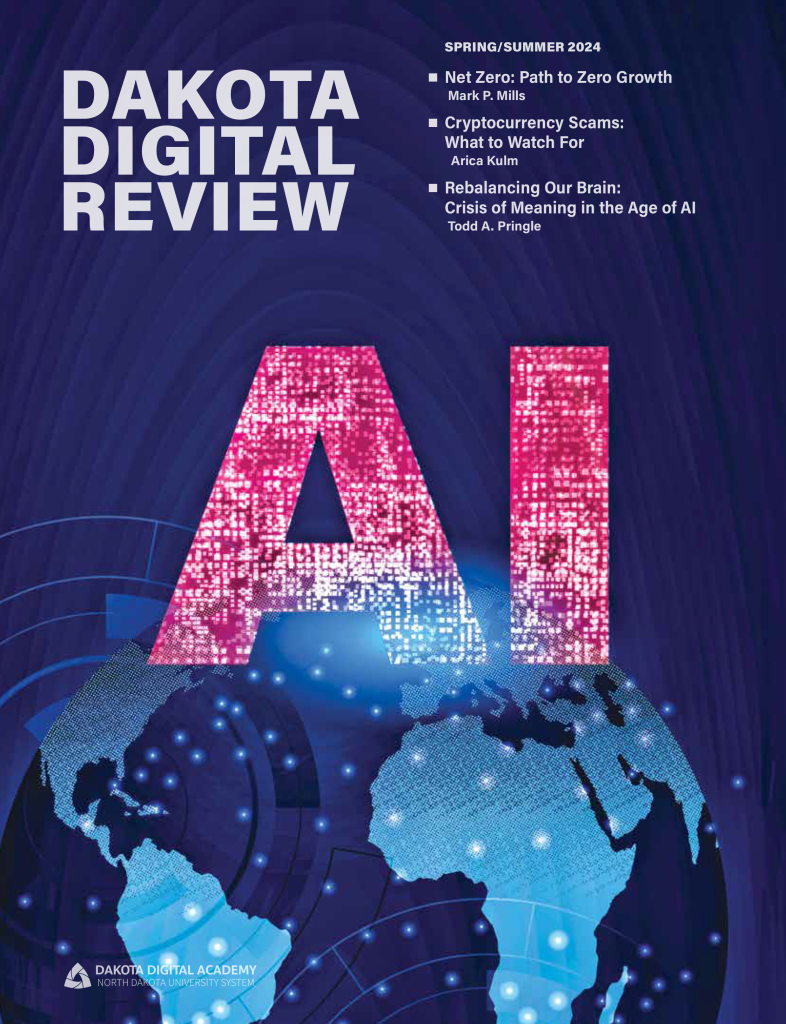The cartoonist Walt Kelly said it best, “We are confronted with insurmountable opportunities.” What sorcerer or ancient magician could have imagined what we take for granted today: video conferencing across continents, texting at 30,000 feet on a jet liner, data mining, robotic surgery. And this is just the beginning. Digital wonders we can’t envision yet will delight us and perform seeming miracles for the good of humanity.

As cyber technologies become increasingly ubiquitous, however, their penetration into our personal, family, professional and social lives is accelerating, and their influence is growing. In response, DDA will offer courses in the profound social, ethical, legal and policy implications of the cyber sciences.
To amplify DDA’s systemwide approach across 11 colleges and universities, and to engage and educate the general public, DDA now presents Dakota Digital Review, which is being published both in print and online.
Dakota Digital Review will cover the cyber sciences, as well as related legal, political, regulatory, social and ethical issues, and digitization’s impact on the humanities and the arts.
In addition to creating opportunities, digital technologies pose serious challenges: cybersecurity hacks by enemy nation states disrupting corporations, government agencies and even, December 2020, one of the world’s largest cybersecurity firms; the massive transfer of power and wealth from small and analogue businesses to Big Tech companies as result of lockdown responses to COVID-19; blatant censorship by Big Tech that threatens free speech and the foundations of democracy; disinformation campaigns and election integrity; privacy and surveillance concerns; artificial intelligence (AI), automation and job loss; rural broadband, especially when students must take classes from home.
Dakota Digital Review is written and edited for the general educated reader. It is vitally important that residents throughout the region—whether working in government or business, or who are retired—become fluent and engaged in cyber sciences and their ramifications.
Dakota Digital Review elevates discussions and debates about digitization, facilitating better preparation of government and business, parents, students and voters to make crucial decisions about our collective future and about our individual and family lives.
Articles are written mostly by faculty and students but not to promote their universities. Instead, higher education’s intellectual resources are being mobilized statewide to better serve both within and beyond the academy.
A note of appreciation is due to Jerry Anderson who does the photography, graphic design and layout for Dakota Digital Review, as well as to Tom Marple for illustrations. The same is due to Katy Cox who designs and masters our website (URLs above), where access to our courses and this magazine is available.
Patrick McCloskey, Editor-in-Chief
Patrick J. McCloskey is the Director of the Social and Ethical Implications of Cyber Sciences at the NorthDakota University System and serves as the editor-in-chief of the Dakota Digital Review. Previously, he served as the Director of Research and Publications at the University of Mary and editor-in-chief of 360 Review Magazine. He earned an MS in Journalism at Columbia University’s Graduate School of Journalism. McCloskey has written for many publications, including the New York Times, Wall Street Journal, NationalPost and City Journal. His books include Open Secrets of Success: The Gary Tharaldson Story; Frank’s Extra Mile: A Gentleman’s Story; and The Street Stops Here: A Year at a Catholic High School in Harlem, published by the University of California Press.
Contact at patrick.mccloskey.1@ndus.edu or call 701.955.0767







